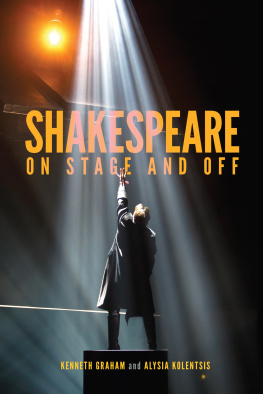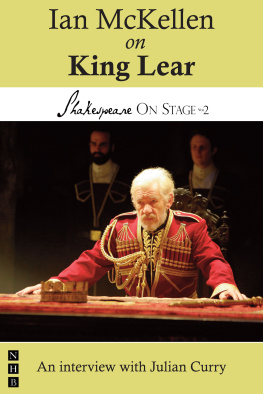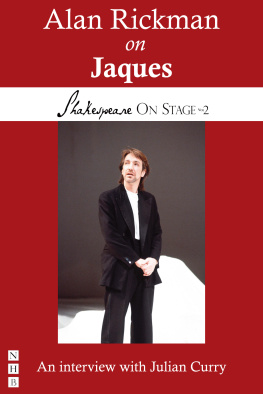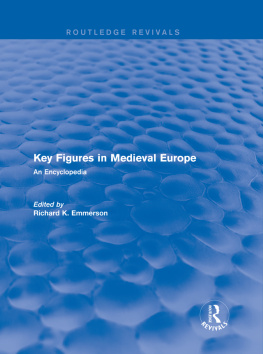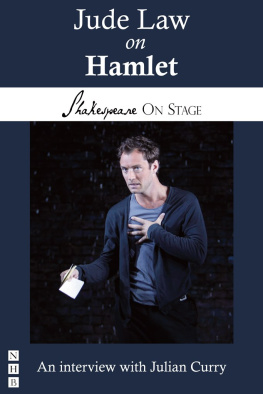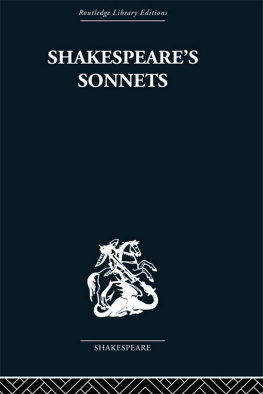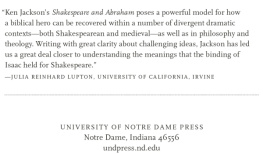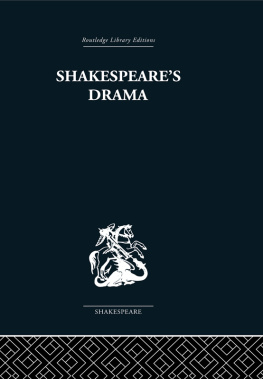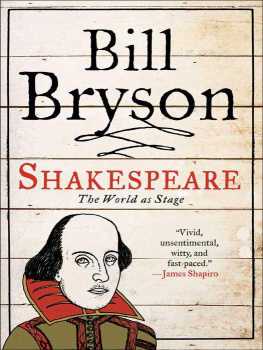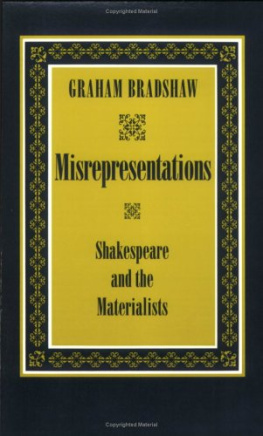Kenneth Graham (editor) - Shakespeare On Stage and Off
Here you can read online Kenneth Graham (editor) - Shakespeare On Stage and Off full text of the book (entire story) in english for free. Download pdf and epub, get meaning, cover and reviews about this ebook. year: 2019, publisher: MQUP, genre: Home and family. Description of the work, (preface) as well as reviews are available. Best literature library LitArk.com created for fans of good reading and offers a wide selection of genres:
Romance novel
Science fiction
Adventure
Detective
Science
History
Home and family
Prose
Art
Politics
Computer
Non-fiction
Religion
Business
Children
Humor
Choose a favorite category and find really read worthwhile books. Enjoy immersion in the world of imagination, feel the emotions of the characters or learn something new for yourself, make an fascinating discovery.
- Book:Shakespeare On Stage and Off
- Author:
- Publisher:MQUP
- Genre:
- Year:2019
- Rating:5 / 5
- Favourites:Add to favourites
- Your mark:
- 100
- 1
- 2
- 3
- 4
- 5
Shakespeare On Stage and Off: summary, description and annotation
We offer to read an annotation, description, summary or preface (depends on what the author of the book "Shakespeare On Stage and Off" wrote himself). If you haven't found the necessary information about the book — write in the comments, we will try to find it.
Shakespeare On Stage and Off — read online for free the complete book (whole text) full work
Below is the text of the book, divided by pages. System saving the place of the last page read, allows you to conveniently read the book "Shakespeare On Stage and Off" online for free, without having to search again every time where you left off. Put a bookmark, and you can go to the page where you finished reading at any time.
Font size:
Interval:
Bookmark:

SHAKESPEARE
ON STAGE AND OFF
SHAKESPEARE
ON STAGE AND OFF
Edited by
Kenneth Graham and Alysia Kolentsis
McGill-Queens University Press
Montreal & Kingston London Chicago
McGill-Queens University Press 2019
ISBN 978-0-7735-5924-0 (cloth)
ISBN 978-0-7735-5925-7 (paper)
ISBN 978-0-2280-0006-8 (ePDF)
ISBN 978-0-2280-0007-5 (ePUB)
Legal deposit fourth quarter 2019
Bibliothque nationale du Qubec
Printed in Canada on acid-free paper that is 100% ancient forest free
(100% post-consumer recycled), processed chlorine free
This book has been published with the help of a grant from the Stratford Festival.

We acknowledge the support of the Canada Council for the Arts.
Nous remercions le Conseil des arts du Canada de son soutien.
Library and Archives Canada Cataloguing in Publication
Title: Shakespeare on stage and off / edited by Kenneth Graham and Alysia Kolentsis.
Names: Graham, Kenneth J. E. (Kenneth John Emerson), 1960 editor. | Kolentsis, Alysia, 1976 editor.
Description: Includes bibliographical references and index.
Identifiers: Canadiana (print) 20190161507 | Canadiana (ebook) 20190161531 | ISBN 9780773559240 (cloth) | ISBN 9780773559257 (paper) | ISBN 9780228000068 (ePDF) | ISBN 9780228000075 (ePUB)
Subjects: LCSH: Shakespeare, William, 15641616Dramatic production. | LCSH: Shakespeare, William, 15641616Stage history. | LCSH: Shakespeare, William, 15641616Adaptation. | LCSH: Shakespeare, William, 15641616 Criticism and interpretation.
Classification: LCCPR3091 .S33 2019 | DDC 822.3/3dc23
This book was typeset in 10.5/13 Sabon.
For Josephine Harris and in memory of Dr Jules Harris
CONTENTS
KENNETH GRAHAM AND ALYSIA KOLENTSIS
ANTONI CIMOLINO
CHRISTINA LUCKYJ
LAUREN ERIKS CLINE
RODERICK H. MCKEOWN
CHRISTIE CARSON
LINDA MCJANNET
JULIA REINHARD LUPTON
JULIA REINHARD LUPTON
RUSSELL J. BODI
DAVID B. GOLDSTEIN
JEFFREY R. WILSON
R.W. JONES
PETER HOLLAND
HAYLEY OMALLEY
AMRITA SEN
LISA S. STARKS
BRANDON CHRISTOPHER
JACOB CLAFLIN
GINA HAUSKNECHT
ERIC SPENCER
FIGURES
Gower in front of porthole. Pericles (dir. Trevor Nunn), Theatre for a New Audience, Brooklyn, NY, 2016. |
ACKNOWLEDGMENTS
Many of the essays in this volume were presented in June 2017 at the second Shakespearean Theatre Conference, Shakespeare 401: Whats Next? in Stratford, Ontario. Two others were presented in 2015 at the inaugural Shakespearean Theatre Conference, Language in Text and Performance. We would like to thank everyone involved in both conferences, including our institutional sponsors, the Stratford Festival, the University of Waterloo, and St Jeromes University. We are especially grateful to Dr Jules and Josephine Harris for their generous financial support of the conferences, as well as of this book. Mark Abley, Jonathan Crago, Kathleen Fraser, and the rest of the team at McGill-Queens University Press believed in this project from the beginning and provided expert guidance, while the insights of the presss anonymous readers significantly strengthened the result. Finally, we would like to thank our families, Beth and Jimmy Graham and Mike, Lucia, and Anna Crosby, for the love, encouragement, and joy they give us.
SHAKESPEARE
ON STAGE AND OFF
INTRODUCTION
KENNETH GRAHAM AND ALYSIA KOLENTSIS
Shakespeare On Stage and Off is dedicated to the proposition that Shakespeares enormous prestige as poet, playwright, and popular culture phenomenon both enriches our culture and provides an occasion to reflect upon developments within it. The books three parts, Playing with Shakespeare, Working with Shakespeare, and Living with Shakespeare, explore contemporary stagings of Shakespeares plays, propose a new approach to those plays through the work we do every day, and probe Shakespeares persistent and adaptive presence in life beyond the stage. Together they portray a Shakespeare who animates conversations about such apparent oppositions as work and play, tradition and experiment, performance and identity, unity and diversity, similarity and difference, reader and text, and audience and artist. This Shakespeare is inescapable, but he is also malleable, subject to constant redefinition and new understandings. He speaks to us only as much as he is spoken to by us. What we are is inseparable from what he is, or, to put it differently, we understand him partly by understanding ourselves, and vice versa.
The idea for this volume emerged from Shakespeare 401: Whats Next?, the second Shakespearean Theatre Conference, held in Stratford, Ontario, in June 2017, and the majority of the chapters that follow were first presented there. Written for an audience both of specialists and of general readers with a special interest in Shakespeare, the nineteen chapters showcase the variety and vitality of Shakespeares interaction with contemporary life and culture. Their subjects include stage productions of Shakespeare in London, Stratford-upon-Avon, Edinburgh, New York, Minneapolis, Los Angeles, Toronto, and Stratford, Ontario; live theatre broadcasts from London and Stratford-upon-Avon (as watched in Austin, Texas, and South Bend, Indiana); films from India and the United Kingdom; and television shows from the United Kingdom and the United States. There are also chapters on reading stage directions and modernizing Shakespeares language, and a cluster of chapters proposing a new multidisciplinary approach to the plays that emphasizes their relationship to professional and personal forms of knowledge. Regrettably, there are limits to what a volume such as this can cover. Readers will find no consideration of graphic and manga Shakespeare (especially popular among students familiar with these formats), web series such as Nothing Much to Do (also aimed at a young audience), or novelistic rewritings of Shakespeare (e.g., the Hogarth Shakespeare); and, apart from Amrita Sens chapter on Vishal Bhardwajs Shakespeare films, they will find no sustained discussion of Shakespeares presence outside North America and the United Kingdom. What they will find is a set of lively and readable contributions in several written modes, from close readings to personal reflections, from careful analysis of staging practices to an account of a dinner party. All, we hope, are provocations to further thought about our relationship to Shakespeare, wherever we encounter him.
PLAYING WITH SHAKESPEARE
As Antoni Cimolino begins this section by pointing out, the text of Hamlet is a script that can be performed on stage in multiple ways. Playing Shakespeare entails a process of playing with Shakespeares script, a process of invention and discovery in which some possibilities are tried and rejected, others are tried and adopted, and many more are never attempted at all. Initially, the director faces major decisions about performance style: for example, Christie Carson shows that a production of Two Gentlemen of Verona might aim for psychological realism and believable characters, or it might opt for a less naturalistic, more self-consciously theatrical effect. As the process approaches its goal of performance, it becomes more and more specific by virtue of the choices it embodies. Hamlet, for example, may wear black tights or blue jeans; he may appear to be melancholy or mad; and he may be played by a man or a woman. Together, the accumulated performance choices of live theatre create new meanings for the play in its historical moment: this is not some universal idea of
Next pageFont size:
Interval:
Bookmark:
Similar books «Shakespeare On Stage and Off»
Look at similar books to Shakespeare On Stage and Off. We have selected literature similar in name and meaning in the hope of providing readers with more options to find new, interesting, not yet read works.
Discussion, reviews of the book Shakespeare On Stage and Off and just readers' own opinions. Leave your comments, write what you think about the work, its meaning or the main characters. Specify what exactly you liked and what you didn't like, and why you think so.

